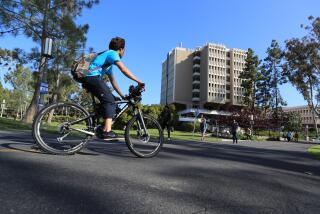Trial Over Alleged E-Mail Crime Begins
- Share via
SANTA ANA — The first federal trial in the nation involving an alleged hate crime on the Internet began here Tuesday with jurors being asked to resolve a critical dispute.
Was former UC Irvine student Richard Machado a cyber-racist when he sent a terrifying electronic mail, threatening to “hunt down and kill” Asian students at the university? Or, was he just a despondent and bored teenager who simply committed “a stupid prank” to provoke a response?
The jury of three women and nine men was presented with those questions during opening statements in the trial of Machado, a 19-year-old Los Angeles man who was indicted by a federal grand jury last November on 10 felony counts of civil rights violations. The trial has reignited the debate about freedom of speech on the largely unfettered Internet.
In her opening statements, Assistant U.S. Atty. Mavis Lee told jurors that Machado wanted to terrify the 59 mostly Asian students to whom he sent the death threat.
According to Lee, Machado hunched over a computer in the school’s engineering building on Sept. 20, 1996, and sent the message to some students logged onto the school’s computer system.
*
Lee read Machado’s chilling e-mail a couple of times during her opening statements.
The message, signed by “Asian Hater,” warned that all Asians should leave UC Irvine, otherwise the sender would “hunt all of you down and kill your stupid asses.”
“I personally will make it my [life’s work] to find and kill everyone of you personally. OK? That’s how determined I am. Do you hear me?”
As Lee read the message, jurors viewed it on a large poster board.
The prosecutor said that several students who received the message were angry and “just plain scared.”
Deputy Federal Public Defender Sylvia Torres-Guillen, who is representing Machado, didn’t dispute that her client sent the e-mail. But she said he meant no harm.
“This case is about a teenager who thought it was OK to send a rude and offensive e-mail over the Internet,” she said.
Torres-Guillen painted her client as a young man who became distraught--and flunked out of school--after his eldest brother was killed in Los Angeles.
According to the defense attorney, Machado had planned on becoming a doctor after he enrolled at UCI in September 1995 and became the lone member of his family to enter college.
But a month later, “his life began to crumble” when his brother was killed in a carjacking, Torres-Guillen said.
His “inability to concentrate” caused him to receive failing grades, ending in expulsion from UCI in the summer of 1996.
But Machado did not tell any family members about his expulsion, she said.
During the fall semester of 1996, Machado would have another brother drive him to school where he would hang out in the computer laboratory until it was time to go home, Torres-Guillen said.
There he would check his e-mail and surf the Internet, she said. On the day he decided to send the hateful e-mail, Machado was bored and wanted to start a “dialogue” with people who were signed onto the school’s computer network, Torres-Guillen said.
He even told campus investigators, who had quickly traced the e-mail to him, that he simply wanted to “mess around” and “meant no harm” by the message.
*
Earlier in the day, U.S. District Court Judge AliceMarie H. Stotler said the defense could call an expert witness to testify about the etiquette and culture of cyberspace.
The expert is expected to support Torres-Guillen’s contention that people who log onto a computer network accept the risks of encountering inflammatory speech, because the Internet is a domain where talk is cheap and “flame wars”--or vitriolic exchanges among computer users--are commonplace.
Federal prosecutors have instead that Machado’s threats to kill students were not protected speech.
If convicted, he faces up to 10 years in prison.
More to Read
Sign up for Essential California
The most important California stories and recommendations in your inbox every morning.
You may occasionally receive promotional content from the Los Angeles Times.













